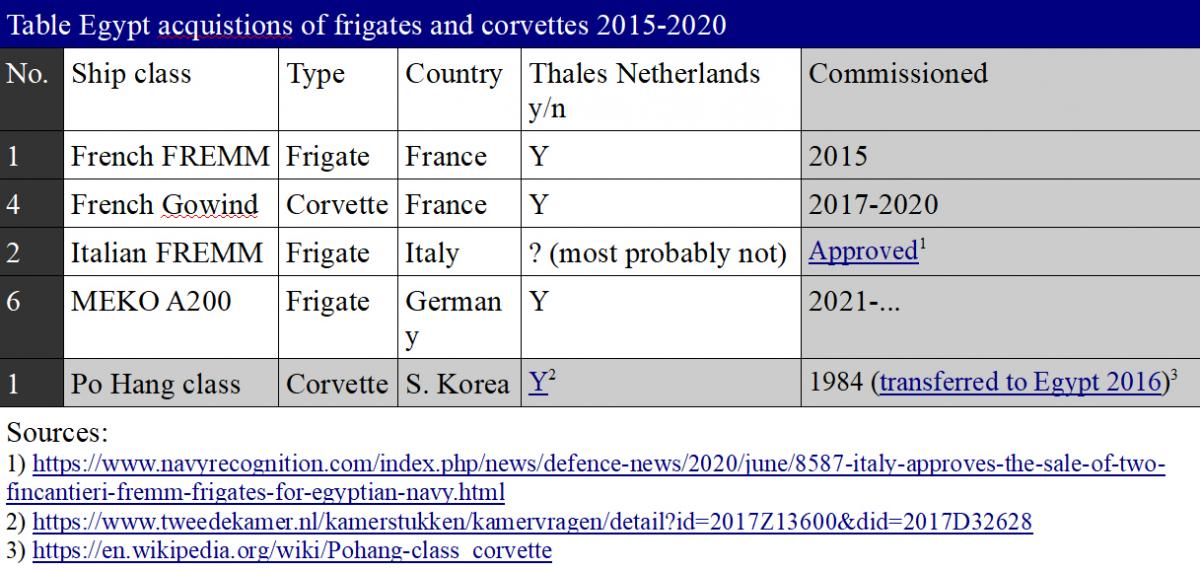This week the Dutch government answered questions of the Dutch MP’s Karabulut (Socialist Party) and Van Ojik (GreenLeft) on a large military sale of C3-technology to Egypt. Hiding behind commercial confidentiality the government refuses to name the company involved and the frigate – build by a European shipbuilder – on which the systems will be assembled.
Enormous
The Dutch naval website marineschepen.nl concluded however on the few facts available that the military technology is meant for a German MEKO-frigate, probably a A200 type. Although the Dutch government did not provide information on the selling company, the order, valued €114.038.400, must be for Thales, and concerns detection and tracking radar, fire control systems, and combat data systems, concluded marineschepen.nl. Because potentially five more of the same vessels will follow, in the end the order might bring the total amount at €660 million for the Dutch branch of the French Thales concern. In relation to the financial size of Thales Netherlands the sale to Egypt is enormous, almost one and half the company’s annual turnover.
Thales Netherlands
Thales is a special company in the Netherlands. Together with Fokker and Damen it makes up the biggest military and security companies in Netherlands. But it is also one of the few companies in which the Dutch government has a ownership, although only 1 percent. Because of this position the government has to report on Thales in an annual report on Beheer Staatsdeelnemingen (Governance State Holdings), which provides scarce information on Thales Netherlands. The report states that the company is one of the least transparent companies in the Netherlands, but gives info on size of work force, turnover, profit and share of exports in total sales. They are respectively €459 million, € 39 million and 66 percent in 2019.
MEKO-frigate deal
Last year the German government gave green light for the delivery of six MEKO-frigates produced by Thyssenkrupp Marine Systems (TKMS) to Egypt as part of a deal worth about €2.3 billion. The sale had a peculiar history. In an earlier phase the Saudi’s pressured the Egyptians to freeze the deal because of German criticism in connection to the Khashoggi murder. “The deterioration of Saudi-German relations, particularly after Saudi Arabia’s killing of journalist Jamal Khashoggi, reportedly led to Riyadh putting a hold on providing funding for Egypt’s purchase” Navy Recognition quoted the French Paper La Tribune. But the cold soon was out of the air and the deal continued.
Naval build-up
The naval acquisition policy of Egypt is gigantic, the MEKO-frigates order is one of many. Taking together all Egyptian naval orders of the recent past it turns out Cairo is establishing a fleet stronger than all other North African fleets. Not only has it acquired a Helicopter Landing Ship from France and a number of submarines from Germany, when just focussing on the addition of frigates and corvettes in the last five years it seems Cairo is to build a naval fleet belonging to a large and prosperous country. This navy will be capable of power projection and defending spheres of influence. Able to control and police the Suez channel and Eastern Mediterranean, but also capable of coastal bombardments and naval blockades. While the most visible are the sales from France, Italy and Germany, the Dutch silently play their part. Fire control and combat data systems from the Dutch town Hengelo are adding to a growing naval strength of one of the major players in that region.
MP Van Ojik asked the Dutch government on what ground it trusts the navy of Egypts will stay clear from the blockade of Yemen. According to the Dutch government the role of Egyptian navy in the anti-Yemen coalition is “very limited”. This involvement is mostly reported in general terms, like in a SIPRI April 2019 background paper on foreign military presence in the Horn of Africa, which notes “continuous support for war in Yemen, including naval blockade of Yemeni ports.” A report clearly stating involvement of the Egypt navy in the blockade on Yemen Stop Wapenhandel considered to be from the International Maritime Organisation turned out to be part of an Mexican education project. But Yemen is not all. Egypt is expanding its military and naval foothold as reported before and prepares to establish a naval base in Somaliland. Ethiopia is not amused with these plans, because Egypt locked horns with Ethiopia over the water of the Nile River.
One of the questions asked by MP Karabulut was on the remark by Egyptian president Sisi to use military violence when Tripoli should concur Sirte from the Libyan strongman Haftar. Dutch government answered that it is currently unclear if the developments will really lead to military action, and if so, whith what materiel. Mahmoud Gamal, researcher at the Egyptian Institute for Political and Strategic Studies, however concluded: “factors that may make al-Sisi’s declared intervention in Libya most likely are currently increasing.” A navy role can be expected. Sirte is a coastal town and Egypt is in the middle of a maritime dispute with Turkey. It is siding with its arch enemy Greece by delineating their bilateral maritime boundaries and exclusive economic zones for exploitation rights of resources. While troops are sent to the border, the Dutch government concludes “there are no concrete steps in the direction of a military intervention.” Let us hope so, but why wait till the sables rattle? One wonders what the region of tension criteria of the European arms export rules mean for the Dutch government: “Member States are determined to prevent the export of military technology and equipment which might … contribute to regional instability.” Not so much one is inclined to conclude, they start to function when the damage is done.
Martin Broek 08/2020
Stop Wapenhandel newsblog on Dutch and international arms trade. Subscribe/unsubscribe
..

